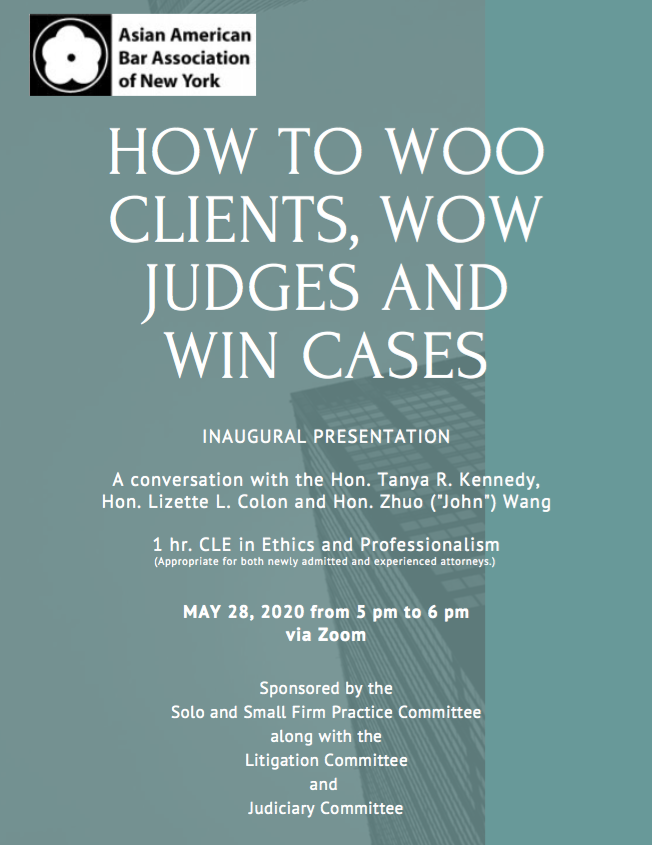
On May 28, 2020, the Solo and Small Firm Practice Committee of the Asian American Bar Association of New York (AABANY) hosted a panel–“How to Woo Clients, Wow Judges, and Win Cases”–discussing professional conduct and standards of civility in the courtroom. The panel was also co-sponsored by the Litigation Committee and Judiciary Committee of AABANY.
The event, moderated by Bart Wu, Chair of the Solo and Small Firm Practice Committee of AABANY, featured panelists: Hon. Tanya R. Kennedy, Supreme Court Justice in New York County; Hon. Lizette L. Colon, Acting Supreme Court Justice in Kings County; and Hon. John Wang, a Housing Court Judge who is a fellow member of AABANY and currently running for Civil Court in District 1.
All panelists emphasized the importance of enforcing civil behavior in the courtroom. Judge Kennedy noted that engaging in civility allows litigators to work towards an effective resolution of the case and weed out unnecessary conduct that frustrates the case. Judge Wang added that standards of civility lift up the bar and the bench, and they help counteract negative perceptions that the public has about members of the bar–for example, that some attorneys are uncooperative.
Judge Colon warned panelists that when litigators engage in disrespectful behavior, they get a reputation for being rude and lackluster, not just to the judge, but also to the staff. Similarly, using condescending language, especially targeting an individual’s identity (for example, referring to a female court attorney as “young lady”), is unacceptable. Judge Wang also observed that courtrooms are now virtual due to COVID-19, and attorneys have difficulty adjusting to the new professional setting. They often sigh very loudly and make inappropriate facial expressions, and forget that they are still in a courtroom.
The judges advised attorneys, especially those who are inexperienced or younger, to study their case very well, research the judge and what they expect (such as reviewing the judge’s individual practice rules), and respect the authority of the court. Judge Colon suggested that attorneys get a summary sheet and review the basics of the case: what discovery is outstanding, if there are any motions, what the injuries or claims are, and what the policy is. Judge Kennedy encouraged panelists to ask their colleagues about what the judge is like in order to better understand the expectations of the judge. Judge Wang urged both seasoned and newer attorneys to respect humility and to not undermine the court’s authority by challenging the judge’s ruling in an unprofessional or inappropriate manner.
We thank the judges for their insightful comments and time, and Bart Wu and the Solo and Small Firm Practice Committee for organizing this event. This event fulfilled one hour of CLE credit in Ethics and Professionalism. For more information on the Committee, please see https://www.aabany.org/page/111.

